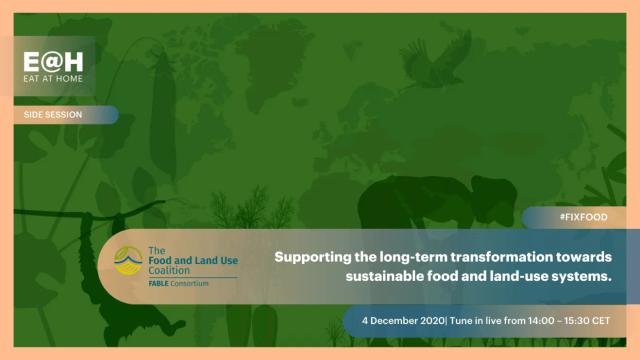FABLE Hosts 7th Consortium Meeting and Launches Global Report
The Food, Agriculture, Biodiversity, Land-Use, and Energy (FABLE) Consortium held its 7th Consortium Meeting from December 1 - 3, 2020. The virtual meeting brought together over 75 participants from 20 FABLE country teams, the FABLE Secretariat (led by SDSN and International Institute for Applied Systems A nalysis (IIASA), with the support of EAT , the Potsdam Institute for Climate Impact Researc h ), and the Food and Land Use Coalition to strategically review the 2020 achievements and prepare for the 2021 climate and biodiversity “super year”.
In three days of interactive sessions, Consortium members shared their insights and proposed actions to continue building on FABLE’s policy and scientific achievements. The result was a comprehensive roadmap designed to further support national action on sustainable land-use and food systems in the run up to the 2021 “super year”, including the critical climate and biodiversity COPS that will be held in Glasgow and Kunming. These major meetings will provide an opportunity to increase the level of ambition, raise the profile of land-use and food systems, and accelerate the implementation of integrated strategies.
The meeting wrapped up on December 3rd with the launch of FABLE’s second global report. This second global report of the FABLE Consortium presents at least one Current Trends Pathway and one Sustainable Pathway for 20 countries. These FABLE pathways assess how far and how quickly improved policies can make land-use and food systems sustainable. They have also been expanded to cover freshwater, future climate-change impacts on crops, a richer discussion of biodiversity targets, and a more detailed trade analysis. The report’s findings suggest that integrated strategies across food production, biodiversity, climate, and diets can meet the objectives of the Paris Agreement and the Sustainable Development Goals (SDGs), but will require deep transformations in all countries.
To conclude, FABLE held a side session in partnership with EAT, as part of the EAT@Home series. The webinar was moderated by Fabrice DeClerck , EAT Science Director, and included a panel led by Aline Mosnier , FABLE Scientific Director, Paula Harrison from UK Centre for Ecology & Hydrology on behalf of the FABLE UK Team, Charlotte González Abraham representing the FABLE Mexico team, and I ngo Fetzer and Shyam Basnet from Stockholm Resilience Centre, Stockholm University representing the FABLE Nordics Team.
The discussion focused on how stakeholder engagement had informed and strengthened the development of these country pathways. The involvement of policymakers allowed country teams to refine their assumptions while showcasing how the FABLE Calculator can support the design of future policies such as the NDCs. Country teams are continuing to engage their national stakeholders in the run up to the UNFCCC and CBD COPs to promote increased ambition and the integration of land-use and food systems into national climate and biodiversity strategies.
While national pathways are critical, they must also be globally consistent if countries are to meet the objectives of the Paris Agreement and the SDGs. “What is unique about FABLE is the ability to connect the country context with the global, and collectively increase ambition. A country is not sufficient in isolation, we must work together to meet global targets,” concluded Harrison, representative of the FABLE UK team.
You can watch the recording of the EAT@Home discussion here.
About FABLE
Operating as part of the Food and Land Use Coalition ( FOLU ), the Food, Agriculture, Biodiversity, Land-Use, and Energy ( FABLE ) Consortium mobilizes top knowledge institutions from 20 countries to support the development of decision-support tools and long-term pathways towards sustainable food and land-use systems. The FABLE Secretariat, led by the International Institute for Applied Systems Analysis ( IIASA ) and the Sustainable Development Solutions Network ( SDSN ), with support from EAT , Bioversity International , and the Potsdam Institute for Climate Impact Research ( PIK ), coordinates the FABLE Consortium.
